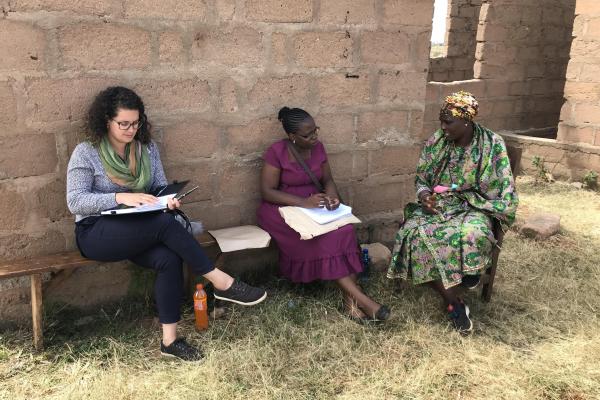Engaged Scholars: Mary Rodriguez

Originally posted here on January 2021 by the Office of Outreach and Engagement at The Ohio State University
Engaged Scholars is a monthly series highlighting Ohio State faculty who have made an impact in our communities through their community-engaged research and teaching. Photo: Mary Rodriguez works with community partners in Tanzania to collect data about agricultural needs in an arid area of the country. Note: the photo above was taken pre-pandemic.
Mary T. Rodriguez
Assistant Professor of Community Leadership
College of Food, Agricultural, and Environmental Sciences / Agricultural Communication, Education, and Leadership
New American and low-income communities face unique and difficult challenges. Through community engaged scholarship, I focus on supporting communities in change processes at the individual, household, and community levels. Understanding the impact of the social system on individual behavior change is essential in helping to mitigate the possible conflicts accompanying social change. Strong, resilient communities are made up of the individuals and their assets, the relationships and bonds between one another, and the organizations and external players that support them. As a leadership practitioner working in this integrated and multifaceted context, it is essential to work with and support all players in their decision making and problem-solving. I therefore strive to develop research-based solutions to build more sustainable and resilient communities through the exploration of behavior change and leadership development.
Why is it important to engage the community in your research and teaching?
The skills I teach in my courses and the research I conduct is all centered on improving the lives of community members. Engaging the community and incorporating their voices ensures that my students can hear from the community first-hand and my research is founded in their assets, needs, and opportunities.
What led you to the path of engaged scholarship? How did you get started?
The need to incorporate the community in my research and my teaching is representative of my experiences as a Peace Corps volunteer. I learned how to sit and listen, how to ask questions, and saw how interventions that don't incorporate their voices, will fail. These experiences showed me how essential community member voices are to the work I do. This led me to do my PhD; I knew I needed more training and experience. I sought further training in community development to learn how to identify community needs and work with their assets for growth and problem-solving. I also gained a better understanding of participatory research methods and ways to conduct community-engaged scholarship.
How has your scholarship benefited from engaging with community partners?
Through engaging with community partners, I have learned the importance of community voice and integration into the research and engagement process. I have learned a lot from past experiences, both great and challenging. Community partners really know best what is going on their communities. They have helped me as the researcher see how to ask the best questions, how to integrate their experiences into the research process, and how to ensure their voices are front and center.
What has been a highlight of your community engagement experience?
Learning about different communities, getting to hear their stories, is my favorite part of the community engagement experience. As a researcher, the end goal is to learn about a community or a phenomena. I have learned to keep my assumptions at bay when working with communities and time and time again I have learned so much.
What advice would you give to faculty and students who are interested in engaging the community in their scholarship?
I would say, take the time to connect with other scholars that have worked in this space. They can give great guidance to help you get started. I would also encourage them to read about how to really engage the community in the research and outreach process. There is a lot to learn; come in with humility and know that there will be challenges but it is worth the effort.
Sample Engaged Scholarship
Course:
Community Leadership for change COMLDR 5000
Publications:
Wilson, K. R., & Rodriguez, M. T. (2018). Resettled refugees and food insecurity in the U.S.: Exploring the caseworkers' role. Journal of Social Service Research. doi: 10.1080/01488376.2018.1480563
Rodriguez, M. T., Lamm, A.J., Odera, E., Owens, C.T. (2015). Evaluating impacts of school-based extension garden programs from a child's perspective. Journal of Extension, 15(1), 1RIB4.
Presentations:
Rodriguez, M. T.Community Engaged Scholarship: A framework for increasing our impact. Association for International Agricultural and Extension Education Conference; Port of Spain, Trinidad and Tobago.
Wilson, K. R. & Rodriguez, M. T. (2017). Food insecurity in resettled communities: Barriers to community resilience among Somali refugee populations. Poster presented at the 2017 AIAEE Conference, Minneapolis, Minnesota.
